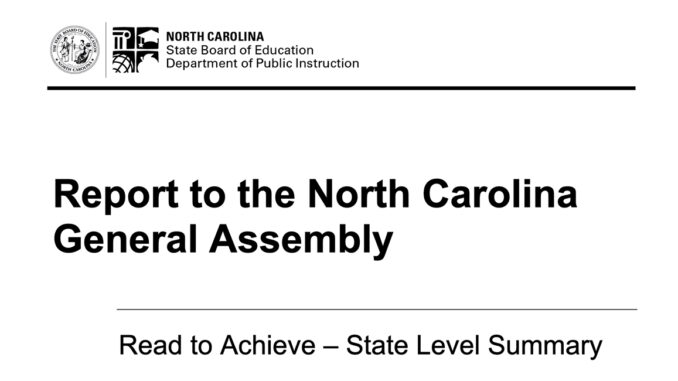
RALEIGH — At its October meeting, the North Carolina State Board of Education heard an update on the state’s Read to Achieve program results for the 2023-24 academic year.
This year’s report on Read to Achieve to the General Assembly, which was changed to be part of the Excellent Public Schools Act, shows steady improvement in reading proficiency for students in grades 1-3 over the past few years. The report parallels statewide test score gains presented at the September board meeting.
For grades 1 and 2, the percentage of students at or above benchmark increased from 2020-21 to 2023-24, with Grade 1 improving from 39% to 70% and Grade 2 from 43% to 65%.
For Grade 3, the overall proficiency rate (including Beginning of Grade, End of Grade, and Retest) increased from 44% in 2020-21 to 49% in 2023-24. When including alternative pathways and good cause exemptions, the proficiency rate rose from 37% to 47% over the same period.
The presentation also included information on reading camps for Grades 2 and 3.
In 2023-24, 27% of eligible Grade 2 students attended reading camp, with 13% achieving proficiency afterward. For Grade 3, 36% of eligible students attended reading camp, with 22% reaching proficiency after the camp. The figures show a slight improvement from the previous year, particularly for Grade 2 students.
The noted attendance at these camps has decreased, with only 7.9% of eligible first graders and 27% of eligible second graders participating. Reading camp enrollment of third graders eligible for priority enrollment was 21.4%, but only 36.3% of those students attended.
The report also states that nearly 20% of all third-grade students in the state were retained or placed in transitional classes because they did not demonstrate reading proficiency.
“Grade ones and two — yes, they are progressing” said Amy Rhyne, senior director of the Office of Early Learning at the N.C. Department of Public Instruction in an interview with North State Journal.
Language Essentials for Teachers of Reading and Spelling (LETRS), the phonics-based program picked by State Superintendent Catherine Truitt and the Department of Public Instruction as part of the Science of Reading dictates in the Excellent Public Schools Act, has enabled teachers to intervene more quickly to help students, Rhyne said.
She also noted that 50% of the districts had just finished Volume Two of LETRS training.
“That we’re moving slowly means we’re moving in the right direction,” Rhyne said, likening the progress to a ship that makes small changes in direction to keep from capsizing.
She acknowledged the reading camp attendance was declining but said despite fewer students enrolled, proficiency levels had increased for those who attended.
“They are compared to what we’ve seen in the past,” Rhyne said when asked if the reading camps were moving the needle for proficiency. “So it’s still up to parents to make the decision on whether or not their child attends camp, and so that’s still in their hands. But I think as it’s more engaging and it’s more innovative, you also hopefully will see that change as we continue moving forward there too.”
Rhyne also mentioned that summer office hours were held to allow districts to “spotlight and highlight” what they were doing in their summer reading camps and share what worked and what didn’t.
Another aspect of the Excellent Public Schools Act is the use of the DIEBELS 8 reading screener, which measures various aspects of literacy in a short test. The screener is given multiple times a year to students in K-3 to search for gaps that a teacher can then use to provide interventions.
Rhyne said the screener has “absolutely” affected rising proficiency rates. She added that while it’s meant for K-3 students, many districts have expanded its use to fourth and fifth grade.
“Just because you hit third grade doesn’t mean your gaps go away,” Rhyne said.
“North Carolina is definitely moving in the right direction based on the data that we are seeing and recognizing the fact that we are shifting an entire system of large-scale system. It’s going to move at a slow pace.
“And so we celebrate that progress and that hard work that’s going into that and that we’re heading in the right direction, but we also recognize we’re not there yet.”



